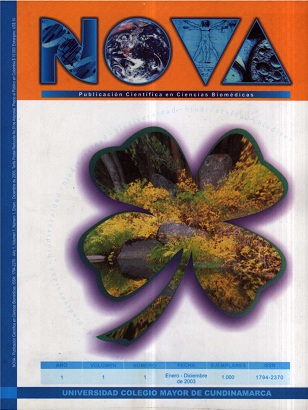NOVA por http://www.unicolmayor.edu.co/publicaciones/index.php/nova se distribuye bajo una licencia Reconocimiento No Comercial- Compartir igual
Así mismo, los autores mantienen sus derechos de propiedad intelectual sobre los artículos,
Declaración de privacidad.
Los nombres y las direcciones de correo electrónico introducidos en esta revista se usarán exclusivamente para los fines establecidos en ella y no se proporcionarán a terceros o para su uso con otros fines.
Biological contamination’s control in the teaching laboratories at the Colegio Mayor de Cundinamarca University in Bogotá , Colombia.
Once it was known the assessment about the problems related to the biological contamination that in the panorama of risks at the Health Sciences School highest incidence was found, the biological risk directly involving the performance of daily laboratory tasks. This finding was supported by the microbiological analysis and the prevention measures were implemented through an educational program, in order to reach a change towards a new culture of risks prevention, and to take care of oneself, to find a better quality of and to be able to develop the responsibility to take care of the environment. The educational program used was named Strategies for a New Biosecurity Culture and it was developed since the knowledge about the environment, the community and the agent. This educational program was implemented to teachers, to managing and to people who work in general services, then the evaluation was followed by an assessment of contamination levels in the laboratories, and this experience was evaluated by the indicator proposed, related to efficiency, efficacy and effectively.
The results of the study was to know that a continuous and permanent educational program teaching since a flexible program development with special strategies that integrate about to be able to form an opinion, to be in the own context and to be innovating, and that if this knowledge is developed since the inducement, the present time, the new training and the evaluation so it was possible to obtain a significance decrease in the appearance of pathological microorganisms in labs.









